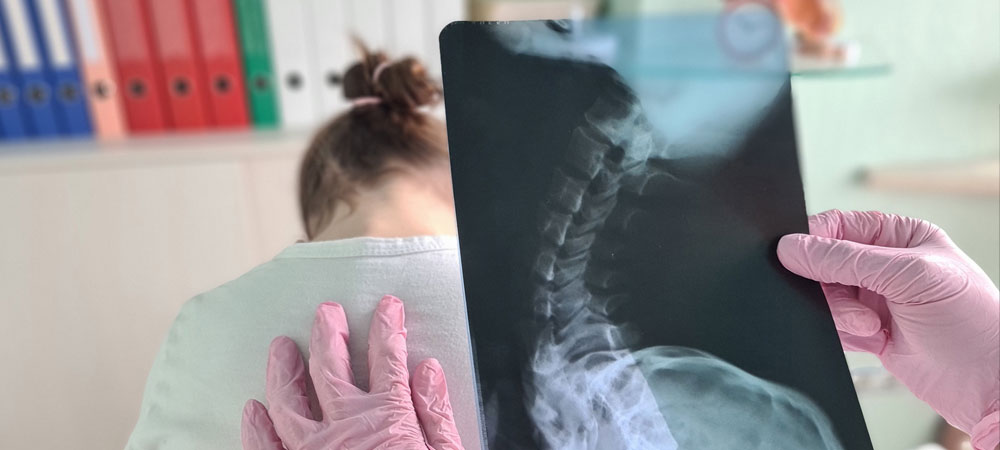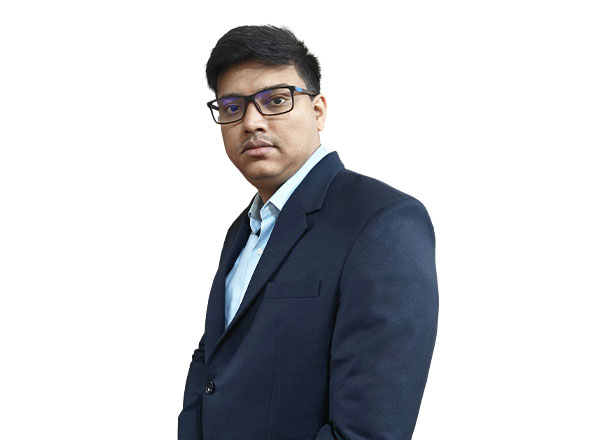Spinal deformity means that the spine is structured abnormally, either due to an injury or an underlying medical condition, and occurs in 3 distinct types. Whether congenital, developmental, or caused by trauma, early intervention is key to minimizing discomfort and improving functionality.
Dr. Mayukh Guha specializes in spinal deformity surgery in Siliguri, offering personalized treatment plans using the latest surgical techniques. His focus on accurate diagnosis and tailored care aims to correct spinal misalignments, relieve pain, and restore quality of life.
2000+
Successful Spine Surgeries
95%
Patient Satisfaction Rate Meet Our Spinal Deformity Specialist in Siliguri
With a career spanning over 8 years, Dr. Mayukh Guha has been treating spinal deformity patients with expertise and finesse. He uses advanced, personalized treatment methods to address conditions like scoliosis, kyphosis, and lordosis, focusing on precision, minimally invasive techniques, and comprehensive care to ensure lasting results and improved mobility for every patient in Siliguri through spinal deformity surgery.
Dr. Mayukh Guha
MBBS, MS Orthopaedics (GOLD MEDALIST), FNB Spine Surgery (ISIC, New Delhi), FMISS, DNB (Orthopaedics), MRCS, MNAMS
Consultant Spine Surgeon in Siliguri, North Bengal Common Types of Spinal Deformities and Their Symptoms
With individual attributes, spinal deformities may occur in different forms:

Scoliosis:
Often regarded as the most common type, scoliosis is identified by the curvature of the spine, from side to side, often forming a 'C' or an 'S' shape. This condition can lead to lower back pain, difficulty in breathing, and decreased movement, if not treated in time.

Kyphosis:
This irregular structure of the spine is caused by the extreme curvature of the spine, especially in the upper back portion. Also known as round back, hunchback or dowager's hump, this condition causes neck pain, muscle fatigue, headaches, and surgery might be needed if the condition is serious.

Lordosis:
Localized in the lower back portion (lumbar) or the neck (cervical), this affects the forward/inward curve of the spine. The normal curve of the spine is supposed to be inward, but the condition exaggerates this inward curve abnormally, causing lower back pain and difficulty in physical activity.

Flatback Syndrome:
Usually, deformities concern the exaggerated curvature; however, in this condition, the spinal posture behaves differently due to extreme stretching. The normal 'S' curve of the lumbar portion of the spine is flattened abnormally, causing pain in the lower back and the possibility of injury.
Early signs of spinal deformities may include poor posture, uneven shoulders or hips, back pain, and limited mobility. In severe cases, these deformities can affect respiratory and cardiovascular health, making timely spinal deformity surgery in Siliguri essential.
Advanced Surgical Solutions for Spinal Deformity Correction in Siliguri
When non-invasive methods fail to provide relief or control the progression of spinal deformities, advanced surgical interventions may be necessary. The innovative technology used by Dr. Mayukh Guha, with the non-invasive correction methods are personalized, keeping the different conditions of the patients in mind.
Key Procedures Offered by Dr. Guha:
Spinal Fusion Surgery:
A procedure that joins two or more vertebrae to stabilize the spine and correct curvature, preventing further progression.
Osteotomy:
This involves cutting and reshaping the bones of the spine to restore normal alignment in severe cases of spinal deformity.
Instrumentation and Rod Placement:
Metal rods, screws, and hooks are used to maintain the corrected position of the spine during the healing process.
Minimally Invasive Spinal Surgery (MISS):
Utilizing smaller incisions for less blood loss and faster recovery, this technique is designed for optimal patient outcomes with minimal disruption.
Each procedure is customized to meet the patient's individual needs, factoring in their age, the severity of curvature, overall health, and functional goals.
Patient Testimonials
After a major accident, I feared I’d never walk properly again. Dr. Guha’s expertise in spinal trauma care gave me a second chance at life!

Arjun Das
India I suffered from unbearable sciatic pain for years. Thanks to Dr. Guha’s treatment, I finally found relief and can move freely again!

Priya Verma
India Dr. Guha’s treatment for my spinal deformity was life-changing. My mobility has improved significantly, and I can now enjoy daily activities without discomfort.

Vikash Agarwal
India Living with scoliosis was challenging, but Dr. Guha’s surgery transformed my posture and confidence. My recovery was quicker than I ever imagined!

Sneha Roy
India I was struggling with severe spinal issues, and surgery was my last hope. Dr. Guha performed the procedure with precision, and now I’m pain-free and active again!

Ravi Menon
India Dr. Mayukh Guha’s expertise in minimally invasive spine surgery made my recovery smooth and pain-free. I was back on my feet much sooner than expected!

Amit Khanna
India Why Choose Dr. Mayukh Guha for Spinal Deformity Surgery in Siliguri?
- Specialized Experience: The restorative process of realigning the deformed spine by Dr. Mayukh Guha is a recognized name for his acclaim in treating advanced spinal deformities.
- Patient-Centered Approach: Personalized treatment plans tailored to each patient’s unique spinal condition.
- Advanced Surgical Techniques: Use of modern technologies and minimally invasive procedures for better outcomes.
- Comprehensive Support: Dr. Guha ensures you have support throughout your medical procedures, from pre-surgery therapy to post-surgery complexities.

Frequently Asked Questions
Answer : The abnormality of the spinal curvature, such as kyphosis, scoliosis, and lordosis, is corrected by procedures that include osteotomy, spinal fusion, and other forms of non-invasive techniques.
Answer : Non-surgical treatments like bracing, physical therapy, and in some cases, serial casting, can help manage mild spinal deformities. However, severe cases or those that worsen over time often require surgical intervention to prevent further complications and restore spinal function.
Answer : Usually advised for individuals suffering from curvature of the spine, causing severe back pain, immobility, or general health issues, spinal deformity surgery is considered when non-invasive treatments like physical therapy or bracing fail to provide relief, or when the deformity worsens over time.
Answer : Yes, most people can lead a normal life after spinal deformity surgery, especially with rehabilitation and physical therapy. The deformity that is being dealt with, the necessary medical procedure, and the required recovery time - all these matter to particularly confirm whether you can return to your normal life or not. It is, thus, always suggested to be under the direct care of the surgeons and to follow their instructions.
Answer : Yes, in many cases, non-surgical methods like physical therapy, bracing, pain management, and lifestyle changes can manage spinal issues. Surgery is usually recommended only when these conservative treatments fail or the condition worsens.
Answer : The most expensive surgeries often involve complex procedures like organ transplants (e.g., heart, liver, or kidney transplant), spinal deformity correction, and neurosurgery. Depending on the choice of hospital and the particular health condition, the cost of surgery can range from lakhs and sometimes even crores.




